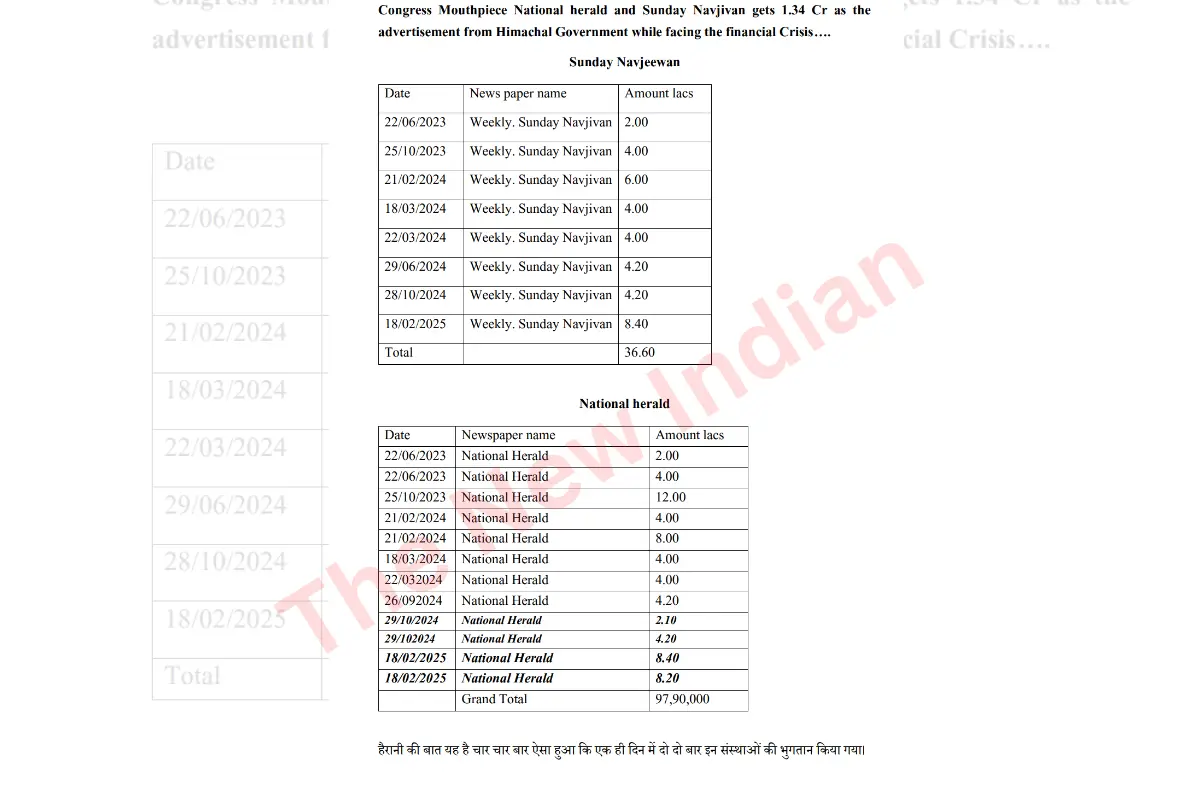NEW DELHI: At a time when the Enforcement Directorate (ED) has sent notices to seize multiple real-estate assets of Associate Journals Ltd (AJL), a disclosure from Congress-run government in Himachal has said that Rs 1.34 crore was distributed as advertisement in just last two years alone to the company-run English newspaper National Herald and Hindi weekly Navjivan.

The documents, in possession of The New Indian, reveals that the advertisement money began getting awarded to Navjivan and National Herald from June 22, 2023, nearly six months after Congress came into power in Himachal Pradesh.
“Overall Rs 36.6 lakh was given to Sunday Navjivan, with two transactions in 2023, four in 2024 and one as recent as February 2025,” the document states. It adds National Herald received Rs 97 lakh, with first installment of paid campaigns starting on June 22 for as small as Rs 2 lakh, going up to Rs 8.2 lakh on February 18, 2025.
AJL is a 1937-public company whose shares were transferred to Young India Limited (YIL) in 2010, giving them ownership of properties worth more than Rs 2,000-crore in India.
The document also states that Congress government distributed Rs 10.27 crore as advertisement money to run promotional campaigns to print publications and Rs 37 lakh to TV channels.
These revelations have been made as part of a reply to Dr Janak Raj, who is an MLA from Bharmour.
CM Sukhwinder Sukhu holds the charge as minister for information and public relations that is responsible for distributing advertisements.
Among other print publications, the largest share went to Punjab Kesri (Rs 2.07 crore), followed by Dainik Savera (Rs 90.66 lakh), Amar Ujala (Rs 87 lakh), Divya Himachal (Rs 52 lakh), Hindustan Times ( Rs 51 lakh), The Tribune (Rs 48 lakh), Himachal Dastak (RS 39 lakh) and The Times of India (Rs 27 lakh).
Among the TV channels, TV 9 Bharatvarsh took away Rs 11.52 lakh, Doordarshan pocketed Rs 6 lakh and News 18 got Rs 4.02 lakh.
The Curious Case of Young India Ltd: A Story of Legacy, Power, and Controversy
In November 2010, a company was quietly born—Young Indian Limited (YIL). On the surface, it was a noble venture: a not-for-profit company aiming to foster democratic and secular values in India’s youth. But behind its benign facade, it was destined to stir up a political storm.
YIL was no ordinary nonprofit. Its shareholders? None other than Sonia Gandhi and Rahul Gandhi, each holding a 38% stake. The rest was split between senior Congress stalwarts Motilal Vora and Oscar Fernandes. The involvement of such political heavyweights in a charitable firm raised eyebrows.
How and why AJL came into existence?
It was in 1938, when Jawaharlal Nehru launched a newspaper called the National Herald as a voice for India’s independence struggle. This paper was published by a company called Associated Journals Limited (AJL). Over the decades, the National Herald, along with its Hindi and Urdu editions (Navjeevan and Qaumi Awaz), grew in stature but eventually succumbed to financial losses, halting publication in 2008.
Though the printing presses stopped, AJL did not vanish. It remained alive—holding on to real estate across India, land and buildings whose worth is believed to be more than Rs ₹2,000 crore.
Revival of National Herald
With an objective to revive the National Herald, the Congress party issues a ₹90 crore interest-free loan to AJL from party funds. But in a curious turn of events, that loan didn’t stay with AJL. As AJL is shown unable to pay the loan, the purpose of journalism is turned into commercial interests.
AJL hands over 99% of its shares to YIL—for a payment of just ₹50 lakh. This transaction gives YIL, and by extension the Gandhis, control over AJL’s vast assets. Buildings once meant to house newsrooms now sat under the ownership of a company whose leaders were deeply embedded in the Congress party.
YIL was registered under Section 12A of the Income Tax Act, qualifying it as a charitable organization with 100% tax exemption. On paper, it was all about public service.
Then Rajya Sabha MP Subramanian Swamy, a political maverick and fierce critic of the Congress called out the entire operation a fraudulent takeover of public assets disguising as a charitable act.
Why Enforcement Directorate (ED) began probe?
After court’s intervention, ED took over the probe, while arguing that Rs 90 crore loan could be a tool to transfer valuable real estate to private control under the garb of a nonprofit.
What Congress says on ED probe?
Congress has hit back. They dismissed the allegations as politically motivated, calling it yet another example of the BJP government’s attempts to target the opposition using central agencies. Their defense was simple: no one personally profited, the loan was for reviving a national legacy, and the entire process was transparent and legal.
As of 2017, Sonia and Rahul remained the principal shareholders of YIL. Motilal Vora, before his passing, and Oscar Fernandes held the remaining stakes. On paper, it was a charitable mission. But in the court of public opinion, it became a symbol of blurred lines between legacy, power, and property.










